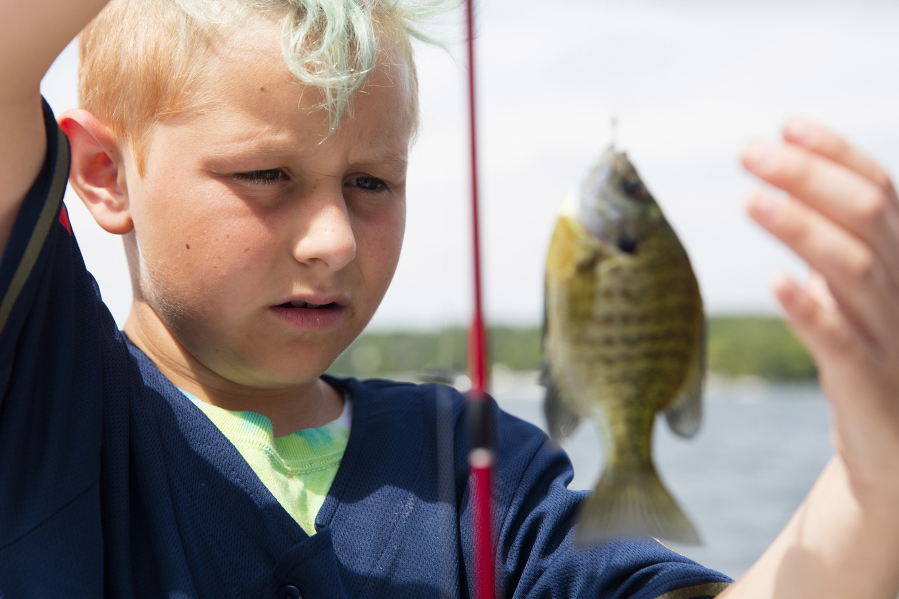WILLIAMS BAY, Wis. — A boy wiggles a worm onto a hook. Hoisting a fish into the air, he clamors for the camp counselor’s attention.
“Are you proud of me now?” he bellows.
It’s the stuff of classic childhood memories. And that’s exactly the point at One Step Summer Camp, where admission requires a cancer diagnosis.
On the shores of Geneva Lake in Williams Bay, this retreat is one of several programs across the country aimed at helping children with cancer focus on just being children. Whether it’s a 16-year-old diagnosed a decade ago or a 6-year-old undergoing chemotherapy, One Step camp is a chance to put aside fears that are all too adult and socialize with peers linked by an unenviable bond.
“We want them to come here and feel like they’re a normal kid because maybe in their home life, they’re the kid at school with cancer,” camp program director Darryl Perkins said.
Dan Suero, 19, knows all too well the toll cancer can take on a childhood. His own was cut short when a doctor told him a tumor was lodged in his spinal cord.
“We all had this childlike innocence before this disease came into our lives,” Suero said.
Here, he said near the lake’s lapping waves, “it’s kind of like heaven in a way, for the piece of us that died and gets to come back to life.”
One Step Summer Camp is one of 11 programs offered by Chicago-based Children’s Oncology Services. Tailored to kids ages 5 to 19 years, offerings include a ski trip in Utah and an educational excursion to Washington, D.C., for high schoolers, as well as one or two weeks of summer camp in the popular Wisconsin vacation spot.
Children’s Oncology Services President Jeff Infusino said the camp’s goal is to recreate childhood innocence, even for a day. To Infusino, it’s important that the 256 kids here feel not only normal, but able. Many sported wristbands showing they’d passed a swimming test that includes treading water for five minutes.
Walking up and down the camp’s hills on a recent hot summer day, Infusino was pulled in for hugs by campers such as Angel Hill, 14, who said she’s been coming to camp since she was diagnosed with leukemia at age 7.
“It’s home to me,” she said about this place, where no one stares at a bald head or a cherubic face bloated from medication.
Some 13,000 kids — most from Illinois and Wisconsin — have experienced One Step since it started 38 years ago.
Thanks to donations and volunteers, camp fees range from $25 to $200, a fraction of the real cost. More than two-thirds of campers request financial help, Infusino said.
In California, Camp Sunshine Dreams has a similar mission to mimic typical summer camps for kids with cancer. Camp Quality offers myriad programs — free of charge — in a dozen states. Programs such as Camp Kesem serve siblings of those with cancer and children whose parents have been diagnosed.
Andrew Christopoulos, 21, needed some initial convincing.
“I was like, ‘cancer camp, that sounds like a depressing, depressing place,’ ” said Christopoulos. “I couldn’t have been more wrong.”
Christopoulos returned to camp this summer as a counselor, endearing himself to campers with his laid-back attitude, owl earring and portable speaker playing rock music.
He, too, came to camp a changed child. Before being diagnosed with the lung disease Langerhans cell histiocytosis, he’d been outgoing, musical. Stuck in a hospital bed, all of that changed.
Finally, at camp, he started playing his music again. (He went on to perform at Lollapalooza.) And, he added with a sly grin, camp is where he had his first kiss.
These days, he speaks breezily about life’s gifts.
“When people have to battle things in their life or have to wade through the darkness, I think the amount of light that they’re able to see is higher,” Christopoulos said.
On this particular day, shouts echoed from an energetic volleyball game. Wet clothes and towels were draped over picnic chairs by the beach. A raucous rendition of “Let It Go” broke out during a macaroni lunch, and the sounds of laughter drifted out of rustic cabins.
Behind every serene setting, of course, is a labyrinth of planning and logistics that are far more involved than at a traditional summer camp. Medical staff members administer oral chemo to those in treatment.
Volunteer doctors and nurses — often the same ones treating the kids back home — hand out pills on the beach.
While a sense of joy pervades the camp, the grim reality is that some campers aren’t able to return year-to-year. This summer, a 14-year-old boy who was a camp favorite passed away just before the first day.
During a talent show, several campers sang one of the boy’s favorite tunes — “Fight Song” by Rachel Platten — as a tribute, belting out the lyrics, “This is my fight song/ Take back my life song/ Prove I’m alright song.”
By the last chorus, the entire camp had joined in.




